Forum
Tuition increase places unfair financial burden on lower income students
On Wednesday, Jan. 29, Washington University announced that it would be increasing its tuition for the 2020-2021 school year. The increase of $2,050 is on par for similar increases at peer universities, with a 3.8% increase at WU compared to an average 3.4% tuition increase at private nonprofit universities reported by the College Board. Following these reports, I began thinking about my own financial obligations to our university and that of my fellow WU students.
 Graphic by HN Hoffmann
Graphic by HN Hoffmann The Equality of Opportunity Project was an initiative housed at Stanford University which recently expanded to become Opportunity Insights at Harvard University. In 2017, they released new research that ranked universities based on socioeconomic diversity. This research found that 21.7% of WU students had a family income in the top 1%, while students with family incomes in the bottom 60% made up only 6.1% of the class of 2013. WU was ranked to have the largest discrepancy between these groups.
In defining these groups, the Equality of Opportunity Project stated that the top 1% constituted a family income of $630K or more and the bottom 60% was a family income of $65K or less in 2017. According to these numbers, the $2,050 extra dollars that WU’s tuition will increase by will make up at most 0.0032% of the top one percent’s income, while it will cost families in the bottom 60% at least 0.032% of their income. The financial burden of this tuition increase will fall on families in the bottom 60% 10 times harder than it will fall on the top one percent.
Students in the top 1% for family income already are represented three times more than students in the bottom 60% in the WU student body, and now tuition is rising again only to hit them harder than higher income students. Higher education is seen as inaccessible to lower income families, and this may play a large role as to why.
Additionally, WU is still yet to become a need-blind institution. It worries me that combined with this increase in tuition, the wait to become need-blind may continue to ostracize low-income students, perhaps even before they apply. I am curious how many overly-qualified applicants WU will lose due to the cost of application and attendance.
I believe that no matter your economic background, you deserve a shot at an education from an institution that fits your academic and personal needs. I believe that when you apply to a university, you should be judged based on academic and personal standards, not on your family’s ability to pay full tuition. I also believe that the cost of tuition should not be an obstacle standing in the way of students’ education.
Should you agree with these statements, then you should also agree that Wash. U. should join its private nonprofit peer universities in becoming a need-blind institution. Increases in tuition may be necessary for operating a university of our size, but it should not prevent the University from doing its job: providing high-caliber students with a high-caliber education, regardless of their income.
